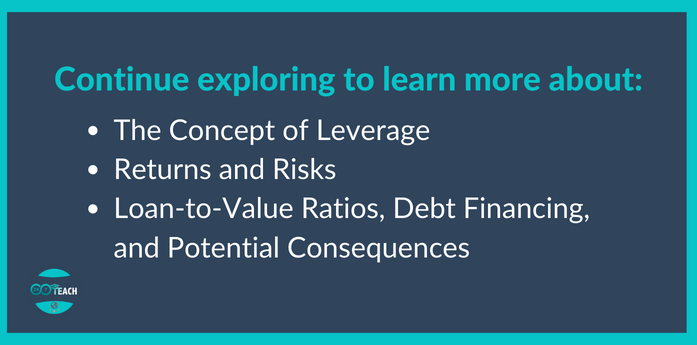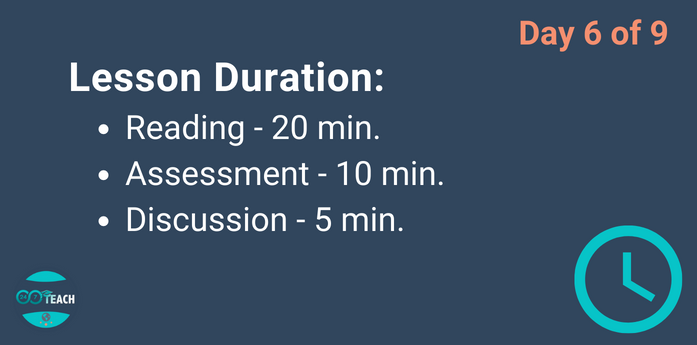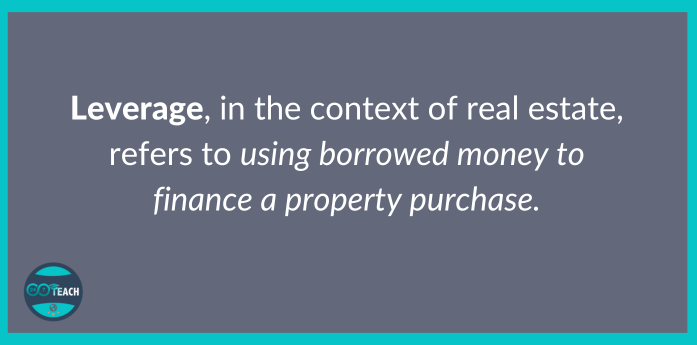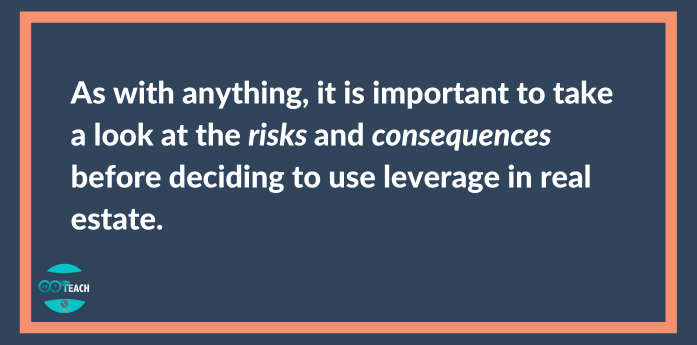Lesson 6: Leverage in Real Estate
Prefer to listen to this lesson? Click here.
Workshop Scenario
Please think of yourself in the following scenario as you complete this lesson.
You’ve decided to be the youngest Real Estate investor in your community. You realize that if you are successful, you can become wealthy and retire at an early age.
Your goal is to learn as much as possible about real estate and real estate investing now so that you can own seven (7) properties by the time you are 21.
In the previous lesson, you took a look at Real Estate teams and how they operate. In this lesson, we introduce you to the idea of leverage.
Lesson Objectives
Understand the concept of leverage and its role in real estate investing
Explain how leverage can amplify returns and risks in real estate investment
Discuss the importance of understanding loan-to-value ratios, debt financing, and the potential consequences of leveraging in real estate investments.
As you read, please consider the following questions:
What is leverage in the context of real estate investing, and why is it significant?
How does the loan-to-value (LTV) ratio determine the amount of leverage used in a property purchase?
What are the potential consequences of high levels of leverage in real estate investments?
Introduction to Leverage in Real Estate
Leverage is a powerful concept that plays a significant role in real estate investing. It allows investors to use borrowed money to purchase properties and potentially increase their returns. Let's explore what leverage is, its importance in real estate, and how it can amplify returns and risks.
Definition of leverage and its significance in real estate investing:
Leverage, in the context of real estate, refers to using borrowed money to finance a property purchase. Instead of investing solely with your own funds, you can leverage other people's money (OPM) to increase your buying power. This means that you can potentially control a more valuable property with less of your own money.
Understanding how leverage can amplify returns and risks in real estate investments:
Leverage has the potential to amplify both the gains and losses in real estate investing. When property values increase, the returns on your investment can be significantly higher compared to investing solely with your own funds. However, if property values decline, your losses can also be magnified.
Loan-to-Value Ratios and Debt Financing
Loan-to-value (LTV) ratios and debt financing are important concepts to understand when it comes to leveraging in real estate investments.
Definition and importance of loan-to-value (LTV) ratios in real estate
The loan-to-value ratio is a measure of the amount of financing relative to the value of a property. It is calculated by dividing the loan amount by the appraised value or purchase price of the property. LTV ratios determine how much leverage is being used in a property purchase. Higher LTV ratios indicate greater reliance on borrowed funds.
How LTV ratios determine the amount of leverage used in a property purchase
A higher LTV ratio means that a larger portion of the property's purchase price is financed through borrowed money. For example, if the LTV ratio is 80%, it means that 80% of the property's purchase price is borrowed, and only 20% is paid with your own funds. The higher the LTV ratio, the higher the level of leverage and potential returns or risks associated with the investment.
The role of debt financing and the impact on leveraging in real estate investments:
Debt financing involves borrowing money, typically from a bank or a mortgage lender, to finance a property purchase. By taking on debt, you can leverage your investment and potentially control a more valuable property. However, it's essential to consider the costs associated with debt, such as interest payments and loan terms. The interest rate and loan terms will affect the overall cost of financing and the potential returns from leveraging.
Consequences and Considerations of Leveraging in Real Estate
While leverage can offer opportunities, it's crucial to understand the potential benefits, drawbacks, and risks associated with leveraging in real estate investments.
Potential benefits and drawbacks of leveraging in real estate
The benefits of leverage include the ability to control more valuable properties, potentially higher returns on investment, and the opportunity to diversify your portfolio. However, leveraging also carries risks. If property values decline or rental income is insufficient to cover expenses, the investor may face financial difficulties, including foreclosure or negative cash flow.
Risks associated with high levels of leverage and their potential consequences
High levels of leverage can amplify the risks in real estate investments. If the property's value decreases, the investor may owe more on the mortgage than the property is worth, which is known as being "underwater." This situation can lead to financial stress and make it challenging to sell the property or refinance the loan. It's crucial to carefully consider the potential consequences of leverage before making investment decisions.
When leveraging in real estate, it's vital to have a good understanding of market dynamics and how they can affect property values. Market fluctuations, including economic conditions and supply and demand factors, can impact property prices and rental income. Additionally, interest rates play a significant role in the cost of borrowing and can affect the feasibility of leveraging. Understanding cash flow is essential to ensure that rental income covers expenses and debt obligations.
In Conclusion:
In conclusion, by comprehending the concepts of leverage, loan-to-value ratios, and the potential consequences of leveraging, you'll be better equipped to make informed decisions when investing in real estate. Remember to consider the risks involved and conduct thorough research before embarking on any investment venture.
Closing Assessment:
Please respond to the lesson email with answers to the following questions, and one of our real estate mentors will respond with feedback.
What is leverage in the context of real estate investing, and why is it significant?
How does the loan-to-value (LTV) ratio determine the amount of leverage used in a property purchase?
What are the potential consequences of high levels of leverage in real estate investments?
Advance your understanding by participating in the 24/7 Discussion Forum:
1. Please answer the following questions in the comment section below and interact with learners from around the world.
How might changes in market conditions and interest rates impact the decision to leverage in real estate investments, and what steps can you take to combat the associated risks?
2. Please read and reply to other learners’ answers in the forum by stating if you agree or disagree with their answers and why. Your replies should offer new substantiated ideas or thoughtful questions.









